Pet Dental Health – Frequently Asked Questions
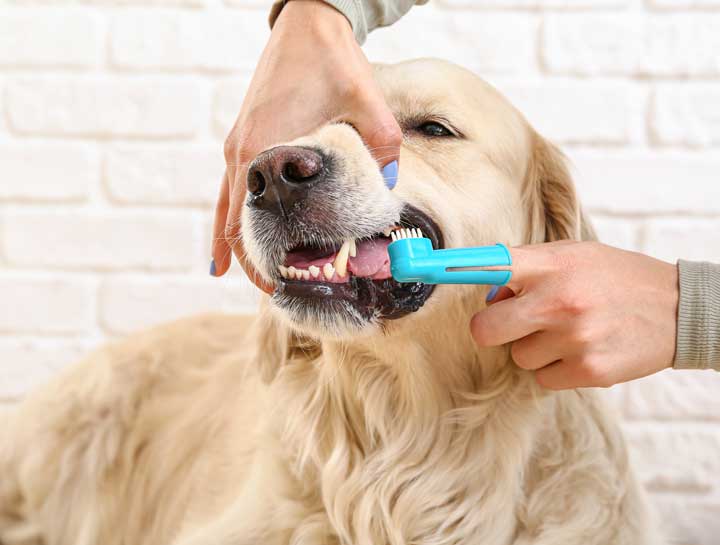
ON THIS PAGE:
- Is wet or dry pet food better for dental health?
- Do I really need to brush my pet's teeth?
- How often do I need to brush my pet's teeth?
- How often should my pet have a dental cleaning?
- Is there an alternative to anesthesia?
- What else can I do for my pet's dental health?
- Some bonus Q & A's
It’s our August Dental Month and we couldn’t think of a better way to observe it than to answer some of your most asked questions about dental health. A special thank you to Dr. Benham, for sharing her expertise and insight.
Dr. Benham has a passion for dental health, and while she’s not a certified veterinary dentist—which is someone that another veterinarian would refer their patient to for advanced dental procedures—her knowledge and skill are an asset to our team.
Is wet or dry pet food better for dental health?
There’s some debate as to which type of food is better for dental health. While some proponents of crunchy kibble say it helps to scrape and clean the teeth as it’s chewed, wet food fans say that kibble can get stuck inside the crevices of the teeth and then the carbohydrates encourage tooth decay; whereas wet food is less likely to stick around. So, which is better, and does the type of food you choose equal good dental health?
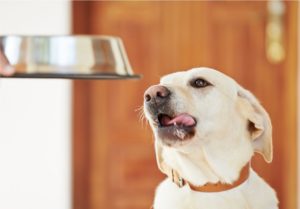
According to Dr. Benham, we tend to see worse periodontal disease in dogs that are fed wet food, but in many of those cases, the dogs were switched to wet food because it is easier to eat because of their advanced periodontal disease.
So, it can be a matter of ‘which came first, the chicken or the egg?’ Dr. Benham goes on to say,
Small dogs in general also comprise patients with the worst cases of periodontal disease. Small dogs are often fed wet food more than large dogs, but many times the reason for that is breed and size related. Trying to figure out how much of the increase in periodontal disease is due to diet is very challenging. We can say we definitely see a difference in dogs who chew their dry food, versus those that “Hoover” it up, indicating that the mechanical abrasive action of eating kibble has some benefits, but only in those dogs who chew their food well.
Do I need to brush my pet’s teeth?
It’s important to note, though, that food alone will not sufficiently clean your pet’s teeth, any more than ‘eating an apple a day will keep the dentist away.’ That’s because there are three types of dental debris: food particles left behind after eating, plaque, and tartar. (There can also be foreign objects such as sticks or bones that can get lodged in the gums and cause infection, but for the sake of this blog, we’re just talking about the natural progression of periodontal disease.)
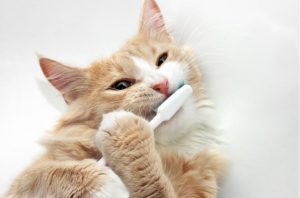
Food particles are the easiest to remove, and a lot is often washed away while drinking or dislodged while chewing a toy.
Plaque is the sticky white stuff that glues itself onto the surface of teeth; it needs to be scraped off. Certain types of dental chews can help somewhat, but brushing is the best bet for removing plaque. Brushing their teeth is how pet owners can make the biggest impact on their pets’ dental health.
How often do I have to brush my pet’s teeth?
Just like in humans, frequency matters. We wouldn’t brush our teeth just once a week and expect a clean bill of health at our checkups. Dr. Benham recommends a pet’s teeth should be brushed once a day, as plaque can return in as little as 24 hours. Brushing every other day can still help, but any less than that is probably not very useful.
That’s because most plaque hardens into the third type of dental debris: tartar.
Plaque becomes tartar within about 48 hours of its first appearance. That means in just a few days your pet will have tartar that cannot be removed by any other means than with dentistry tools. Tartar also forms below the gum line, making professional dental cleanings a necessity at some point in your pet’s life.

How often should my pet have a dental cleaning?
Just how often should your pet have their teeth cleaned? According to Dr. Benham,
If anesthesia were not required, pets would certainly benefit greatly from having their teeth cleaned twice a year, just like humans. However, because pet dentals do require anesthesia, veterinarians have to weigh the benefits of more frequent cleanings against the risks of general anesthesia. For most pets, this means dental cleanings once every 1 to 2 years, although there are pets who need to have it done more frequently. We monitor teeth closely at their routine exams to determine the best time for each individual pet to have a cleaning.
If dentals performed under anesthesia carry risk, is it worth it? Just how serious is periodontal disease? In a word: very. It’s not just a matter of your pet losing some teeth. Bacteria from periodontal disease can lead to bone loss and jaw fracture; bacteria can even travel from the mouth to a pet’s heart, kidneys, and liver. That means the periodontal disease is deadly and therefore merits the relatively small risk associated with anesthesia during dental cleanings for otherwise healthy pets.
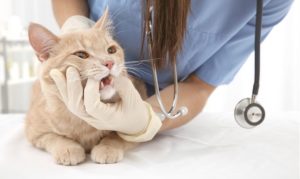
Is there an alternative to anesthesia?
Some groomers and traveling pet services offer anesthesia-free cleanings, which to some people sounds like a great alternative to having them performed under anesthesia, and our clients often inquire about them. This is a very in-depth topic and you can read about it here.
In short, during these types of dentals, it is impossible to clean the inside surfaces of a pet’s teeth or to get below the gum line. These services don’t remove loose or cracked teeth—or perform exams to see what’s causing those issues, as this can only be determined from x-rays. And because your pet does not understand what is happening to them during such a cleaning, it can be a very traumatic experience for them, one that causes them undue anxiety the next time you attempt to brush your pet’s teeth at home.
What else can I do for my pet’s dental health?
Pet owners ask us a lot about what else can be done in addition to brushing. Dr. Benham says, “Less effective, but still somewhat beneficial, are dental chews and water additives. As with most things, some options are better than others.”
We don’t recommend rawhides and Milk Bones for many reasons but suffice it to say they don’t contribute much to dental health.
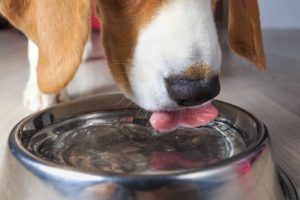
She goes on to say, “When it comes to water additives, most aren’t worth the bottle they come in! However, there are chews and water additives that have gone through additional testing to prove that they are effective at helping reduce tartar accumulation. The best way to know if a product is effective is to look for the VOHC (Veterinary Oral Health Council) seal of approval.”
Some bonus Q&A’s
- Do pets get cavities? Cavities are rare in dogs, but they can happen in those that eat an excessive amount of sweets, such as bananas and sweet potatoes. Cats do not get cavities as we do; they can develop holes in their teeth as a tooth is resorbed—a metabolic disease that is not fully understood.
- Can pets get dentures? Yep! Some veterinarians offer implants.
- Can pets get braces? The answer again is yes! In some rare cases, pet owners may opt to have their pets get braces to correct severe dental malformations.
- Are dogs’ mouths cleaner than humans? No. No, they are not. This question is heard frequently: Will letting a dog lick your wound help it heal? Again, no. Bacteria in a dog’s mouth can contribute to delayed wound healing and infection. Better to have your dog snuggle with you while you recover.
We hope this has answered some questions you may have had about your pet’s dental health. If not, we’ll be happy to answer them at your next appointment!
